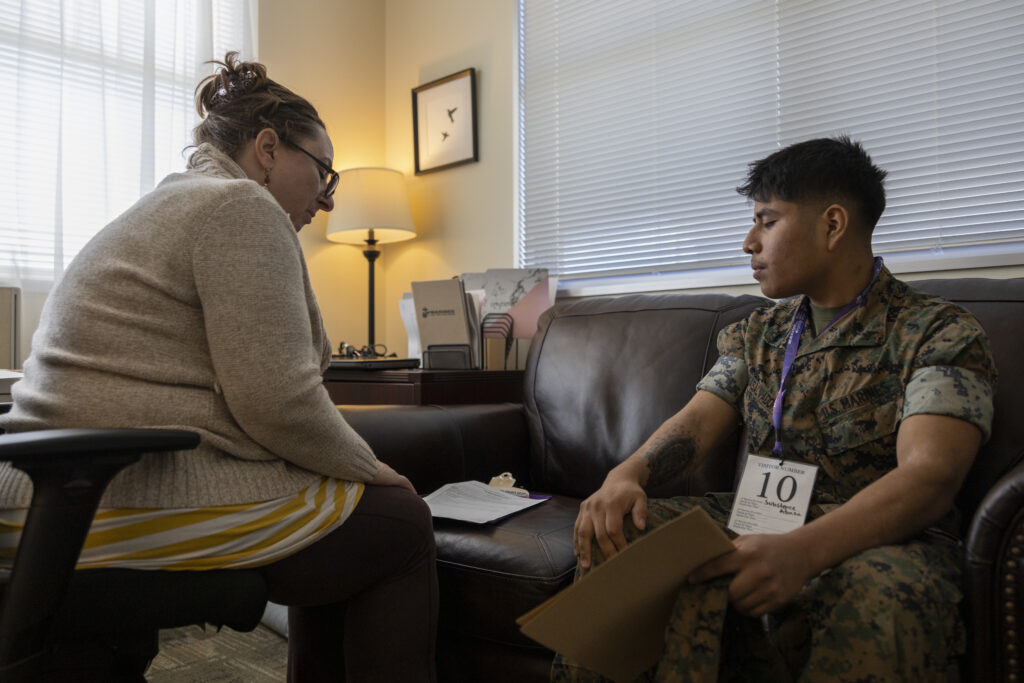The military healthcare system recognizes that military life can be mentally stressful for service members, veterans and their families. That’s why MHS has a wealth of resources for those facing a wide range of mental health issues, in both clinical and non-clinical settings.
“Mental health is essential to readiness,” said Dr. Maria Mouratidis, deputy branch chief of the Defense Health Agency. Center of Excellence in Psychological Health. “You care enough to get help at the first sign that it may help you or improve your quality of life. Peers and leaders are essential in helping servicemembers seek care.
While high-quality treatment for mental health disorders is available at your military installation, resources available in a non-clinical setting, such as a crisis line, website, or your unit chaplain, may also be good options for accessing resources, advice. , and support.
Past military culture has fostered stereotypes that one must be tough and stoic, talking about mental health is weak, and a service member should not show weakness.
“It is important to note that seeking mental health support is a sign of strength, not weakness,” said U.S. Air Force Lt. Col. Anna Fedotova, mental health wing commander at the Kirtland Air Force Base, New Mexico.
MHS offers a variety of resources and consulting services
- Military OneSource: “Military OneSource is a Department of Defense-funded program that provides a wide range of support and resources to service members, their families and survivors,” Fedotova said. “The program provides confidential counseling services, financial and legal assistance, education and employment resources, and support for military life transitions, such as deployments and relocations. Military OneSource is available 24/7 by phone, online chat or video consulting, and all services are free and confidential.
- Program in Transition: inTransition is a free and confidential program that provides specialized coaching and assistance to active duty military, National Guard, reservists, veterans and retirees who need access to mental health care. This includes services necessary for moving to another assignment, returning from deployment, transitioning from active duty to the reserve component or from the reserve component to active duty, preparing to leave military service, and at any other time when they need a new or first-time mental health provider.
- Military and Family Life Counseling Program: The Military and Family Life Counseling Program supports military members, their families and survivors with confidential, non-medical counseling where they are stationed. Non-medical counseling can help individuals resolve issues such as improving relationships at home and work, managing stress, coping difficulties, parenting, and grief or loss.
- Military Crisis Line And Veterans Crisis Line: The Military Crisis Line and Veterans Crisis Line are free, confidential resources for all service members, including National Guard and Reserve members, and veterans. Call, chat, or text a trained counselor who will listen and connect you with the resources you need. There are no fees and you decide how much information to share. The resource is accessible 24 hours a day. For crisis lines, dial 988, then press 1.
- Psychological Health Resource Center: “The Psychological Health Resource Center is available 24/7 to assist service members, families, clinicians and commanders with any questions related to psychological health,” Fedotova said. They specialize in information and resources related to addressing stress, depression, reentry, access to treatment, types of treatment for mental health issues, and many other topics. The center can also help military members, families, clinicians and commanders locate available resources in the community.
- True Warriors Campaign: The campaign promotes a culture of psychological health support by encouraging the military community to seek help, whether it is dealing with the daily stresses of military life or issues like depression, anxiety and post-traumatic stress disorder.
- Chaplains are often the first line of defense against the moral and spiritual concerns of service members. Military chaplains and behavioral health providers play a collaborative role in coordinating support for military members and their families.
You can also use services offered at your base to combat potential stressors to your mental health, including:
- Financial advisory services. You don’t need to tackle issues like mounting debt or saving for college or retirement alone. Financial advisors are available in person, by phone and by video.
- Relationship counseling services. If a relationship is causing mental stress, relationship and marriage counselors can be a good resource.
- Peer counseling. A specialist peer consultation is a relaxed conversation about life challenges and can take place virtually and in a non-clinical setting.
- Substance abuse programs. Prevention, education, and treatment programs are available for substance use disorders at military hospitals and clinics. Other non-clinical programs like Alcoholics Anonymous, Narcotics Anonymous and others can offer an alternative approach for those working with others in similar situations to get back on track.
Often a ward or family member simply needs to turn to those around them for help.
“Military members and their families are our most valuable resources,” said U.S. Public Health Service Cmdr. Brandy Cloud, Head of Research Adoption at the Center for Excellence in Psychological Health.
“There are services available to ensure our most precious resources have access to what they need to ensure the total health of themselves and their families,” she added. “If you think you need care, chances are you need help, contact someone, there is no wrong door or wrong time to get the help and services that you need. »
